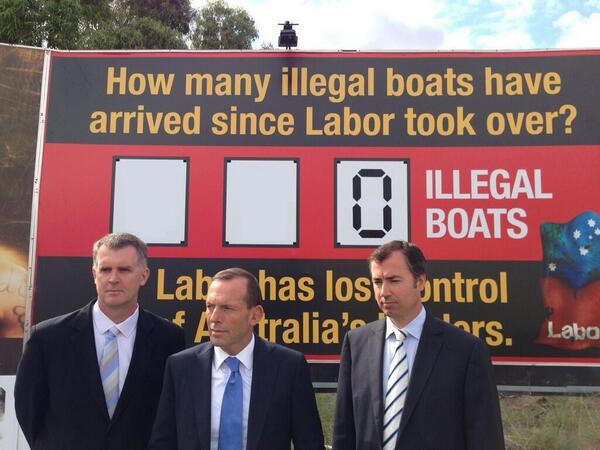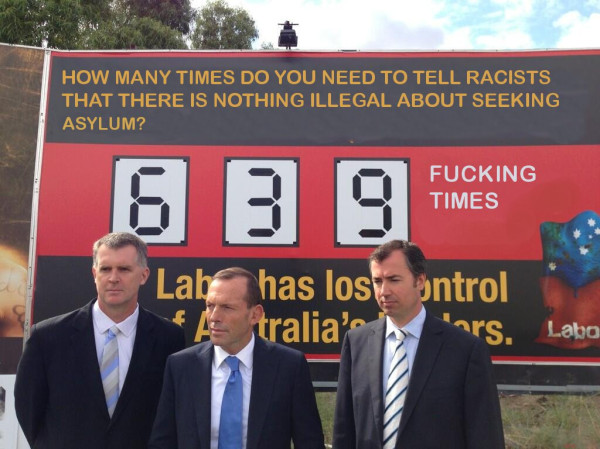So It Turns Out Political Candidates Are Legally Allowed To Lie To You
Under both the AANA Code of Ethics and the Electoral Act, lies like this one are A-OK. This is not a good thing for democracy.

Last week, Essential Research found that Julia Gillard has an approval rating of just 34%. Despite the Coalition releasing just one policy so far, and that policy being bizarrely appalling, Tony Abbott is looking likely to become our next Prime Minister.
Rather than feeling a sense of despair, which would be reasonable, I’ve really just been feeling disbelief. Not so much because of an unbridled optimism, but through a failure to believe that the alien mouse at the heart of the Abbott-suit hasn’t taken a tea break long enough for Abbott to do something that would short-circuit his entire campaign.
I thought yesterday that maybe we were in luck. In what seemed like a totally innocuous tweet, Abbott unveiled a blatant lie.

This, of course, is untrue. It’s not illegal to arrive in Australia unannounced and claim asylum, whether it be by boat, plane, or on the back of a semi-aquatic capybara. An illegal boat isn’t one carrying asylum seekers; it’s one that cruises Sydney Harbour without being registered with Roads & Marine Services.
The phrase “It is not illegal to seek asylum” isn’t so much a mantra of the left, but a nervous tic performed by rational people whenever Abbott says the word “boat”. Hence a series of mash-ups on the original image.

And Geordie Guy had a crack at it too: “If I may @TonyAbbottMHR:”

Here is the man most likely to be our next Prime Minister, unashamedly lying to the country in order to exploit a culture of xenophobia that he and his party have been fostering for over two decades. With this, I will not truck.
So…
To the Advertising Standards Bureau!
I was impressed. The website of Australia’s advertising self-regulating body is really very handy. It’s full of resources explaining the Australian Association of National Advertisers (AANA) Code of Ethics, and what cases it covers.
But on a page conveniently titled Political and Election Advertising, it states: “Currently, there is no legal requirement for the content of political advertising to be factually correct.”
Oh.
The Advertising Standards Bureau (ASB) gleefully handles complaints relating to decency, truth, and advertising/editorial confusion. So if Tony Abbott had unveiled a billboard claiming that voting for him leads to longer lasting sex, we might have a case — but that case wouldn’t be on the grounds that the causation of Tony=satisfaction has yet to be established; it would be because the ad has the word “sex” in it.
But in what is good news for the Sex Party, the ASB divulges that it does not in fact look after any political advertising. Its reasons for this are lengthy, but can be summarised as “Dude, do you know how long that would take?”
Fair enough, I wouldn’t want that job either. So…
To the Australian Electoral Commission!
Now, this website is a user experience clusterfuck. I don’t know how long I looked. All I know is that halfway through I started looking at a volleyball and calling it Wilson.
In a PDF called ‘Electoral Backgrounder: Electoral Advertising‘, the AEC states: “The Australian Parliament has determined that the Act should not regulate the content of political messages contained in electoral advertising. Rather, the intent of the [Commonwealth Electoral Act 1918] is to ensure electors are informed about the source of political advertising and to ensure that political advertising does not mislead or deceive electors about the way in which a vote must be cast.”
So, there’s nothing you can do under Australian electoral law if you find the content of political advertising misleading, unless you’re being mislead about which party has made the ad, or about the electoral process itself.
Under both the AANA Code of Ethics and the Electoral Act, Tony Abbott’s racist lies are A-OK.
What Does This Mean?
This means there is no simple way of telling whether the claims made by any party in the inevitable attack ad frenzy between now and September 14 are true or not. If voters want to make the informed decision required of them in a successful democracy, it is up to each of them to Google every claim made in every election ad, and fact check them before deciding their vote. (Which is exactly what people who use words like “illegals” can be trusted to do…)
In 2007, there was one case of dishonest advertising being held to account: the Lindsay pamphlet scandal. Here, five people with links to the Liberal Party and its local candidate distributed a flyer from a made-up Islamic group endorsing the ALP. Complaints were made by the Labor and Liberal parties to the Australian Electoral Commission, which then referred the matter to the Federal Police. Three of the men were found guilty of distribution of unauthorised electoral material and fined a total of $2250. But the problem wasn’t that they had lied to the voting public; it was that they had failed to register those lies with the Australian Electoral Commission.
So if you spot an administrative error made by any political party this election year, please report it.
And if you’re constantly being lied to by people who want to be trusted with legislative power? The Advertising Standards Bureau suggests you contact your local MP, and register your dissatisfaction.
So that’s something.
–
Eliza Cussen is an emerging creative writer who earns a crust editing websites for Australian non-profits. Her last piece for Junkee was the #ladyQ&A Drinking Game with Erin Turner; her columns have appeared in such places as The Drum, Ramp Up, The Punch and Mamamia. She blogs sometimes at Fix It, Dear Henry.
Feature image via Tony Abbott’s Twitter.